Fun Online Math Activities That Don’t Feel Like Homework
Fun Online Math Activities That Don’t Feel Like Homework
Math is often seen as an interesting yet “hard subject”. Many kids don’t look forward to homework filled with drills and worksheets. But what if learning math felt more like playing a game than doing chores?
With the rise of fun math activities online, students can practice math and boost their scores towards success while having fun. Instead of long, boring lessons, online activities let kids play and explore math in exciting ways. They can solve puzzles and join multiplayer challenges. They can also practice math facts with fun interactive games.
In this article, we’ll explore how online learning has changed how kids engage with math and how success can happen . We will share the best math games for different grade levels and offer tips for parents and teachers to make math lessons feel more like play than work.
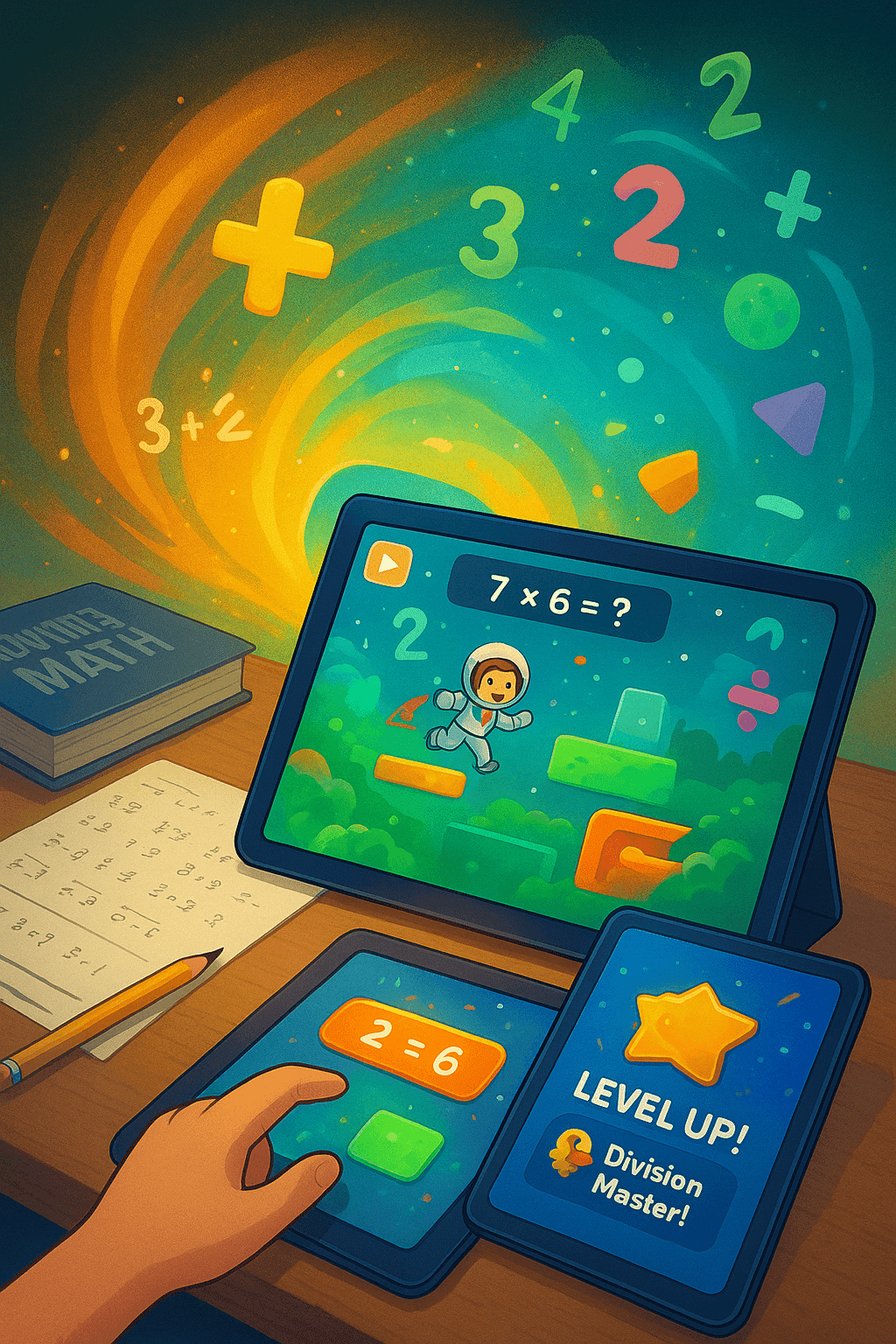
Introduction to Fun Math Activities Online
The digital world has reshaped classrooms everywhere. Online learning isn’t just about reading e-books or watching tutorials anymore. Now, it’s interactive, personalized and really engaging. With fun activities online, students can explore concepts that once felt abstract, unlike traditional assignments . They won't just memorize numbers, they will see math in real life, use visual tools and join team activities that make learning fun.
Think of a child who struggles with fractions in a worksheet. On paper, it might feel overwhelming, but in an online game where they cut pizzas into equal slices, the concept suddenly clicks. The beauty of digital math practice is simple, as it can create engaging experiences . It mixes real-life examples with problem-solving challenges.
Another major benefit is access. Many websites and platforms have free math games. These games give kids extra practice outside the classroom. Students can log in from home, during the school year or over the summer and continue to grow their skills.
Teachers can assign interactive programs that fit the curriculum and meet state standards. This helps kids enjoy math while also having the moment to stay on track academically.
When students see math as an adventure instead of an assignment, amazing things happen
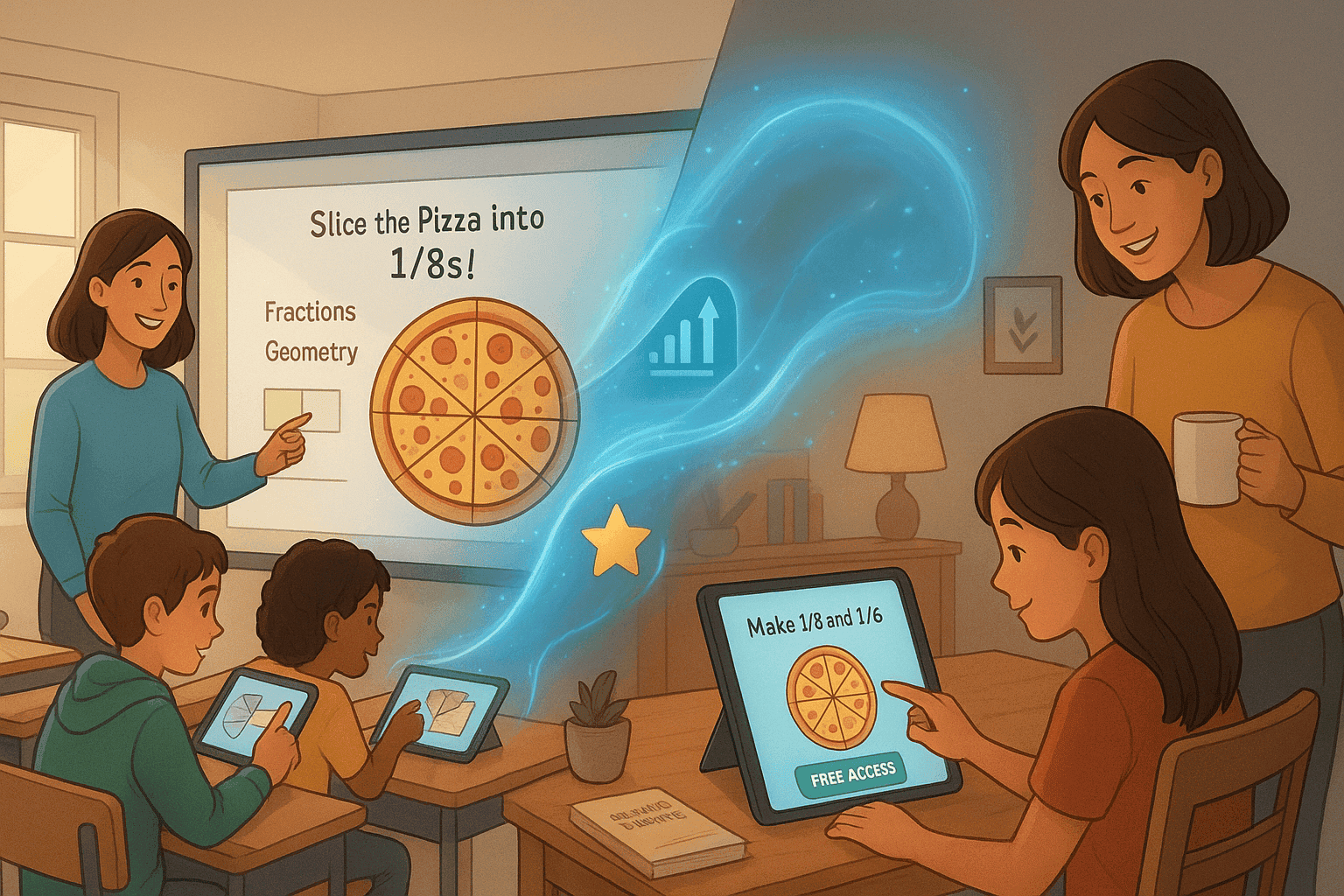
Why Fun Math Activities Online Boost Learning
Why exactly do Why exactly do students love learning through awesome online math games? The answer lies in how these tools blend fun with education. Traditional worksheets often focus on repetition without engagement, but online math programs turn practice into an activity students look forward to.
Here are a few ways online activities boost learning for every person :
Turning practice into play – Instead of solving 20 equations on paper, a child might solve them to win points in a math race. The focus shifts from “finishing homework” to “winning the game”.
Developing new skills naturally – Kids learn best when they don’t even realize they’re being taught. Games designed for different grade levels introduce new skills step by step.
Encouraging teamwork and small groups – Many online math activities allow for multiplayer modes, letting students join friends or classmates. This makes learning feel social, like working with a team.
Tracking progress – Digital platforms give instant feedback on math scores, showing kids their improvement in real time. This motivates them to keep going.
One student in fifth grade was having a hard time with algebra. But in an online program, every time they finished a small challenge, they “leveled up.” Instead of feeling stuck, they started seeing progress thanks to additional features , gained confidence, and soon caught up with the class.
The best part? Online learning moves at the child’s pace, a clear sign of its effectiveness . If they need more practice, it gives them that. If they’re ready for harder lessons, it lets them move ahead. Worksheets can’t do that—but digital learning can.
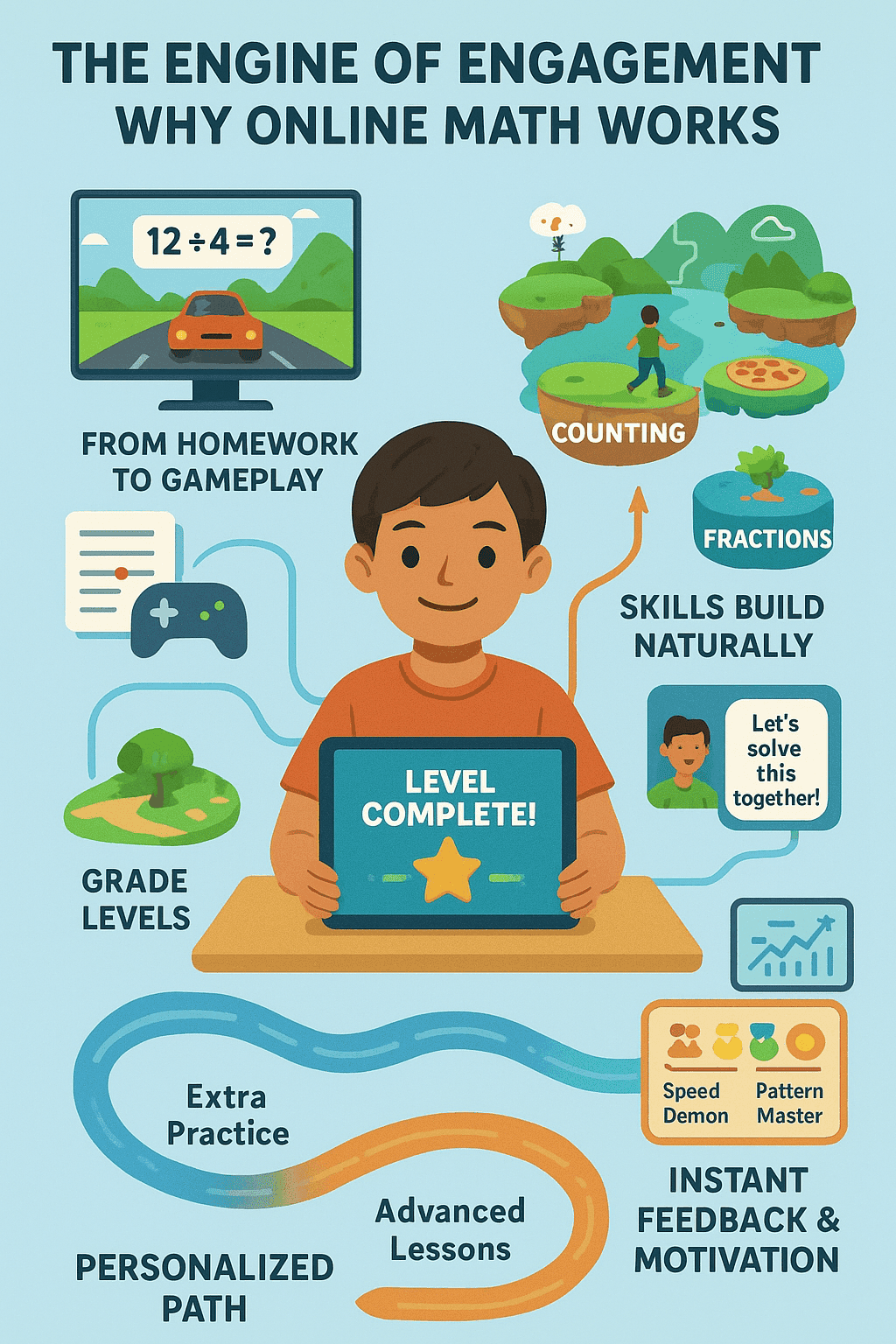
Benefits of Fun Math Activities Online for Kids
Math without homework stress makes learning more effective and enjoyable. Some benefits include making the curriculum more engaging :
Reducing Math Anxiety and Stress from Worksheets
Math anxiety is real and it affects millions of students. Traditional worksheets can overwhelm kids with endless rows of problems. Online math activities on various website ffer a powerful solution by shifting the focus from fear of failure to joy of play.
In games, mistakes aren’t failures—they’re chances to try again. If a child gets an answer wrong, the game gives quick feedback and lets them try once more. This gentle style lowers stress and helps kids become stronger. Instead of feeling embarrassed, they learn that access to tools means mistakes are just part of learning.
Games also remove the pressure of timed worksheets. Instead of staring at the clock in the classroom , kids enjoy colorful, interactive challenges at their own speed. This freedom reduces anxiety and helps them keep moving forward.
Parents and teachers often notice that children who avoid worksheets will happily play math games. That change shows how powerful fun, online math activities can be in a class . When stress fades, curiosity grows, and learning feels natural.
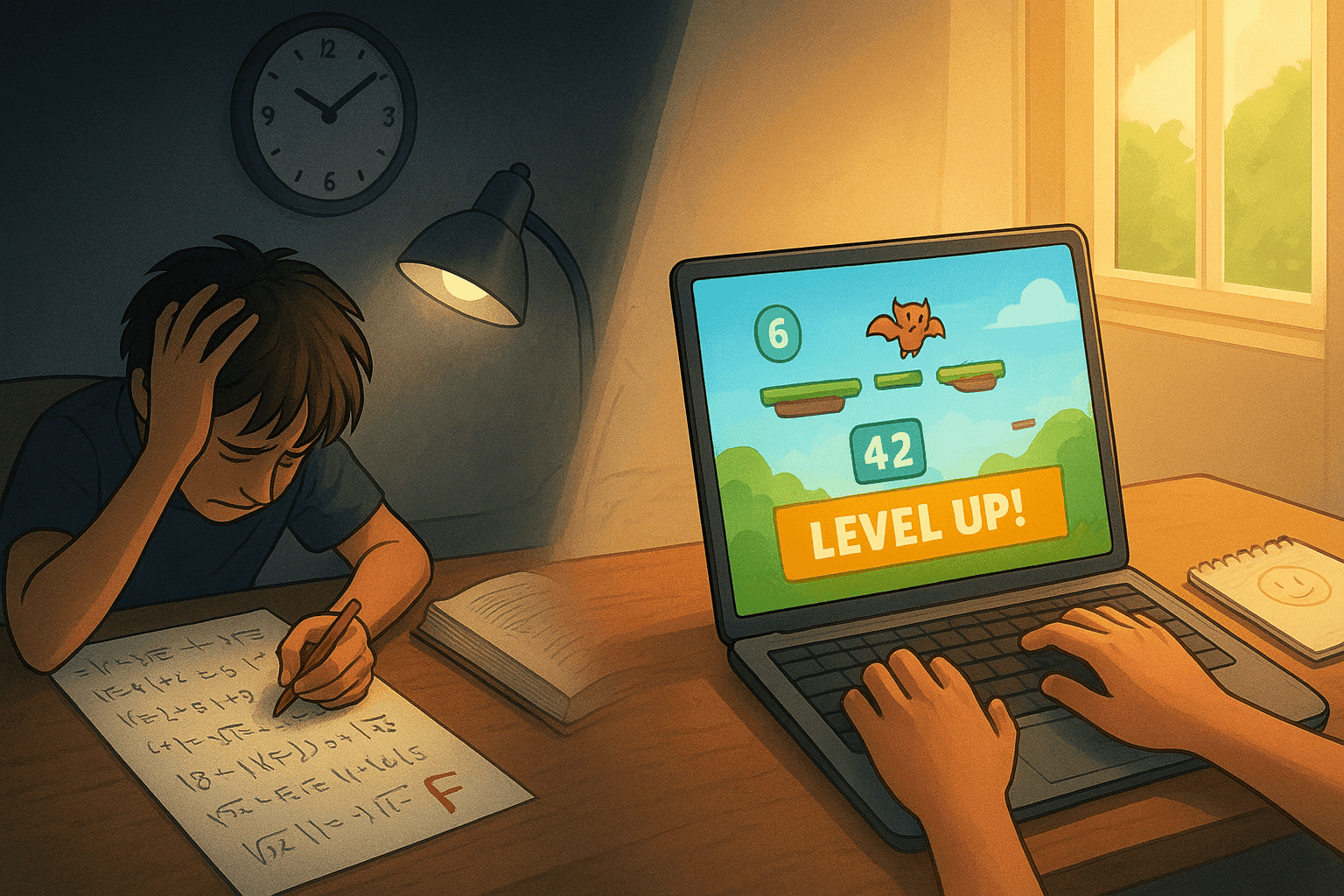
Increasing Focus and Engagement in Learning Fun
Kids today find it hard to stay focused, especially when lessons feel the same every day. Online math games make learning fun by offering free options that turn worksheets into interactive challenges.
Bright colors, sounds and animations keep kids interested. Rewards and amazing new levels make them curious about what’s next, so they stay with it longer.
Games also make kids active learners. Instead of just reading or listening, they click, drag, and solve problems. This hands-on approach keeps their minds busy as they spend time solving problems .
The best part? More focus means more practice. The more problems kids solve as part of a team , the faster their math improves. Over time, they build stronger skills and better study habits.

Enhancing Math Skills and Facts through Repetition
Math gets easier with practice, but practice doesn’t have to be boring. Online math games turn repetition into play. Kids stay focused because every problem feels like a step toward winning.
Instead of endless worksheets, games use rewards and levels to keep kids motivated. Solve five addition problems, and you move ahead. Beat a multiplication challenge, and you build speed and confidence.
These games cover the basics like addition, subtraction, multiplication and division. Once those skills are strong, students can handle harder math with ease.
Fun, practice, progress—that’s how kids master math facts and enjoy learning.
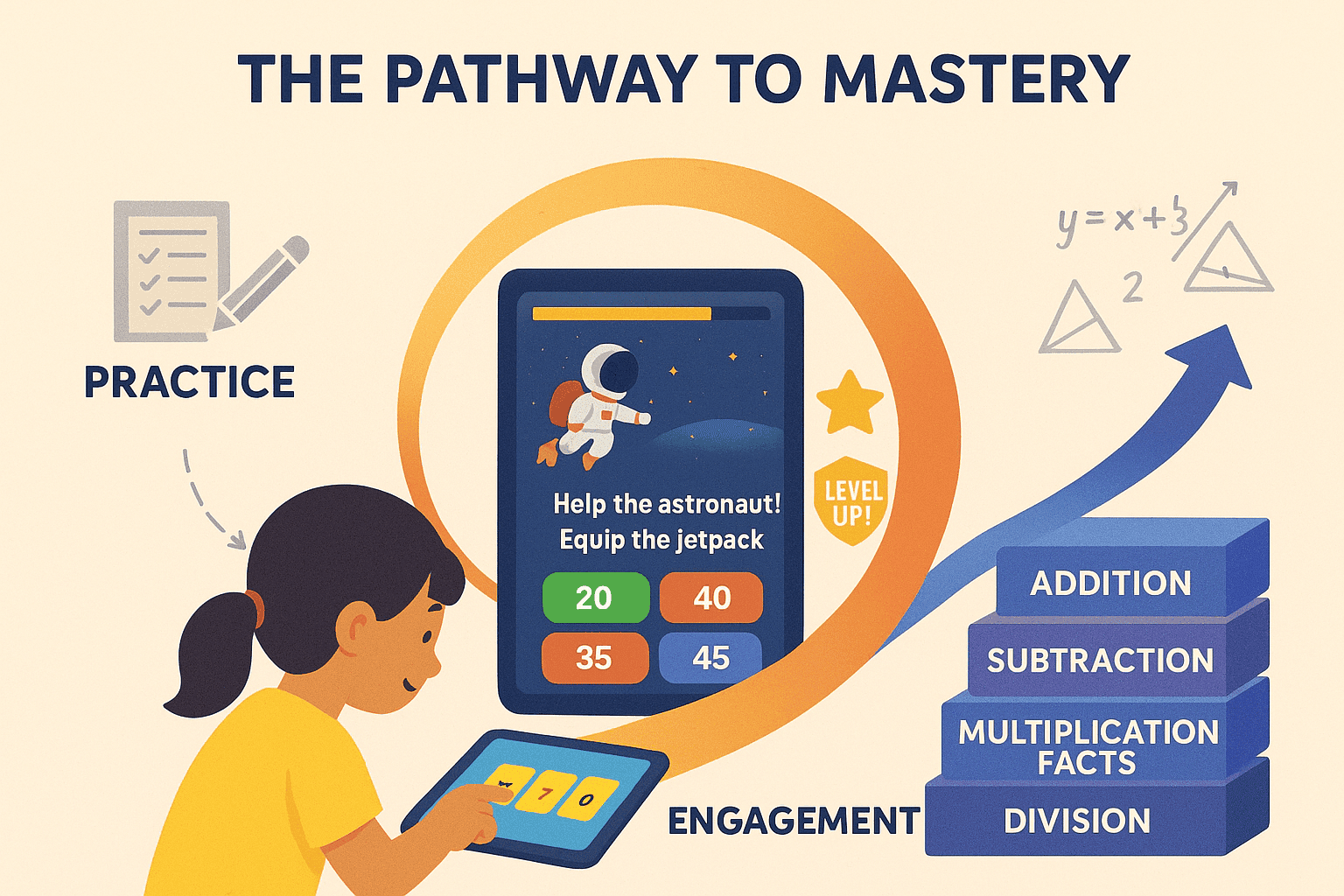
Building Confidence and Improving Math Scores
Many kids think, “I’m just bad at math”. When they believe this, they stop trying and that’s when they fall behind.
Online math games change that. They break problems into small steps kids can handle. Each right answer feels like a win. Each level finished feels like progress. These little wins add up, and kids start to believe, “I can do this”.
Instant feedback makes it even better. Instead of waiting days for a worksheet to be graded, kids see right away what’s correct, what needs work, and how far they’ve come. Progress is visible and that keeps them motivated.
The result? Confidence grows and so do math scores—both in the game and at school. The more confident kids feel, the more they practice. The more they practice, the better they get.
Fun math games aren’t just play. They build skills, confidence, and a positive attitude toward math that lasts.
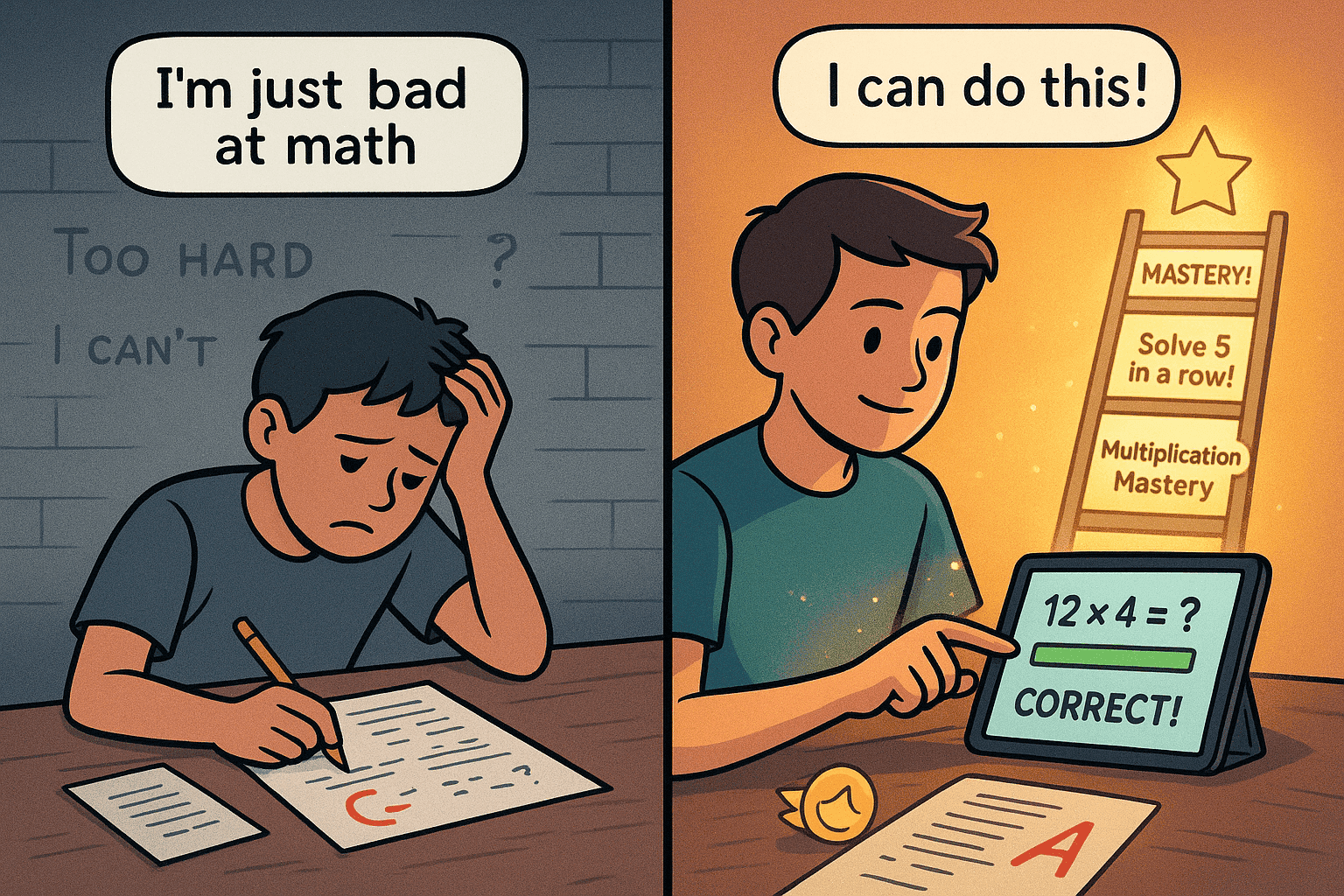
Top Interactive Math Activities For Students That Don’t Feel Like Homework
One of the best things about online learning is the variety of activities it offers. These aren’t boring worksheets on a screen—they’re engaging experiences that keep kids interested and motivated. Here are some of the most effective options:
1. Math-Based Digital Escape Rooms
Escape rooms are popular with students because they mix adventure with problem-solving. In a math escape room, kids solve puzzles, equations, and riddles to move through different levels. Each correct answer takes them closer to completing the mission, so math feels more like a game than homework.
Teachers like using escape rooms in small groups because students can help each other. One child might be good at multiplication, while another is strong with fractions, working together helps them finish faster. Parents also use them at home since they combine fun with learning. The best part? Kids often ask to play again, which shows just how much they enjoy this type of math activity.
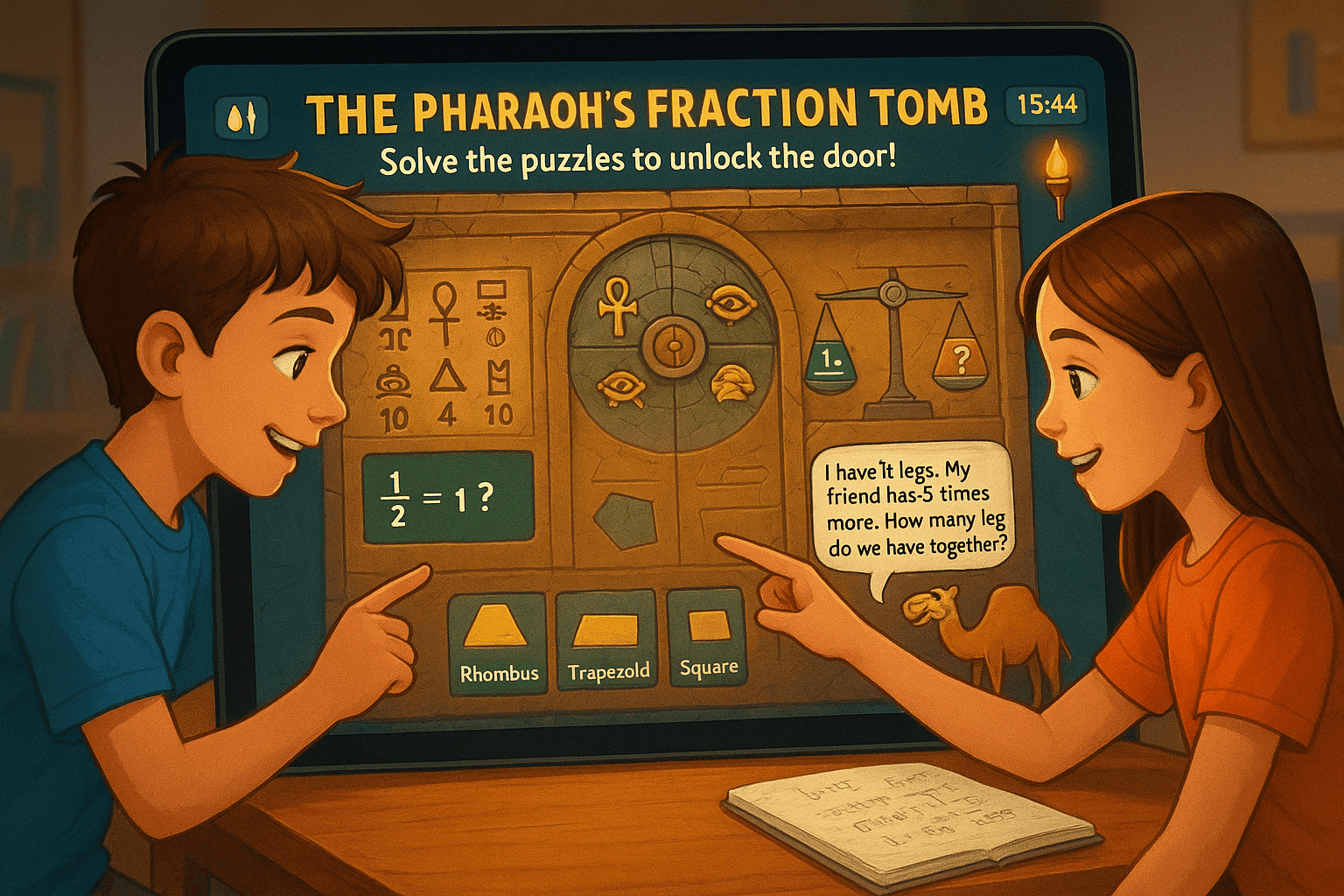
2. Digital Board Games with Math Twists
Classic games like Bingo, Snakes and Ladders, or Monopoly can be turned into fun digital math games. Rolling the dice could mean solving multiplication, answering division problems, or working with fractions. The game setting adds a sense of competition that keeps kids interested while improving their accuracy.
The best part about digital board games is their flexibility. Younger children can practice counting and addition, while older students can tackle fractions or basic algebra. Parents can join in during family game nights, turning play into meaningful math practice. Teachers can also use these games in class to make lessons fun and still meet learning goals.
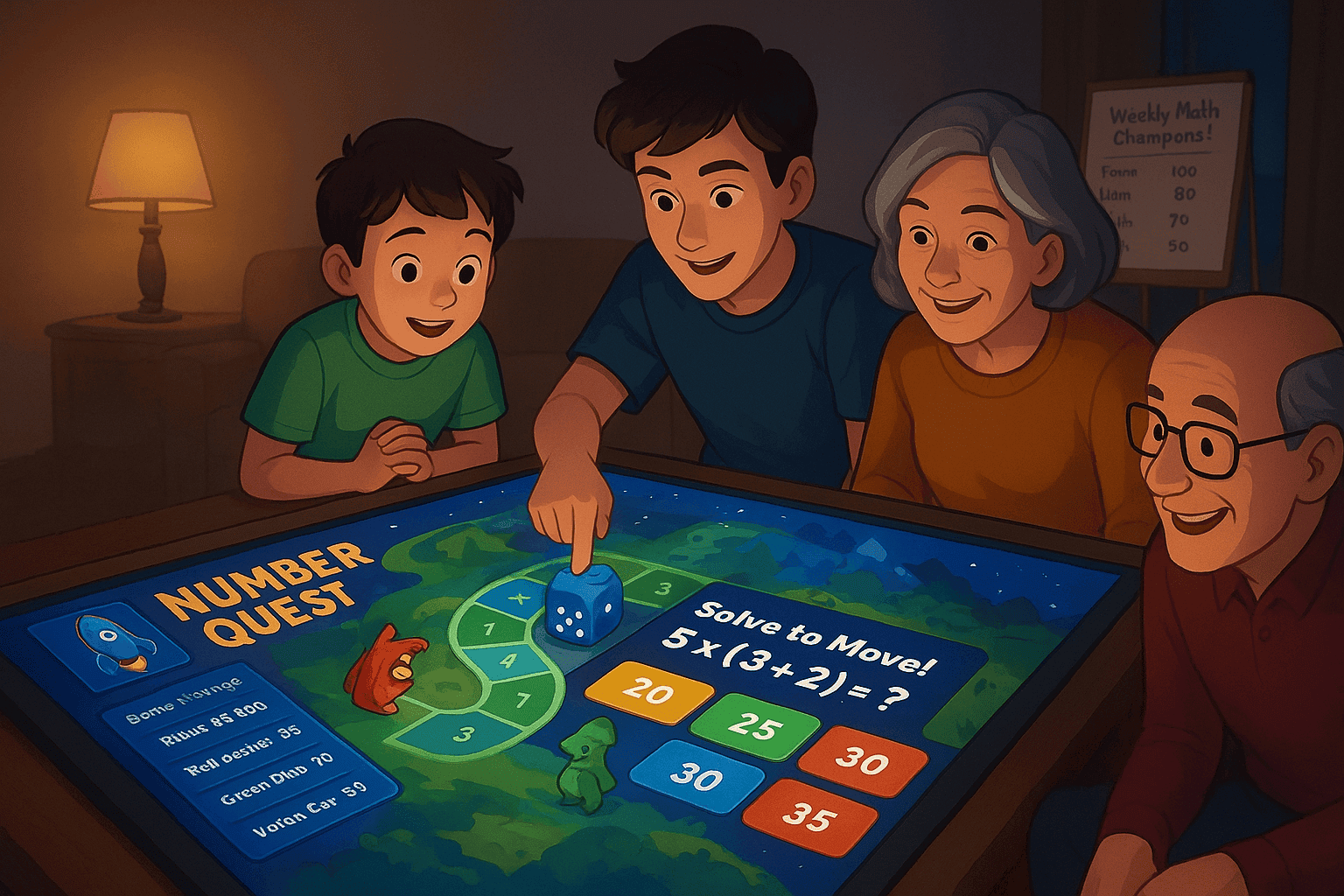
3.Virtual Manipulatives
Math concepts like fractions, shapes, or place value can be hard for kids to grasp. Virtual tools like fraction bars, counters, or digital blocks make learning easier by letting children see and move pieces around.
For example, dragging pieces to compare “½” and “¼” often works better than just reading about it in a book. Parents like these tools because practice time becomes more useful, and teachers value them for making lessons stronger. Since they work for many grade levels, every child can learn better with this kind of hands-on math.
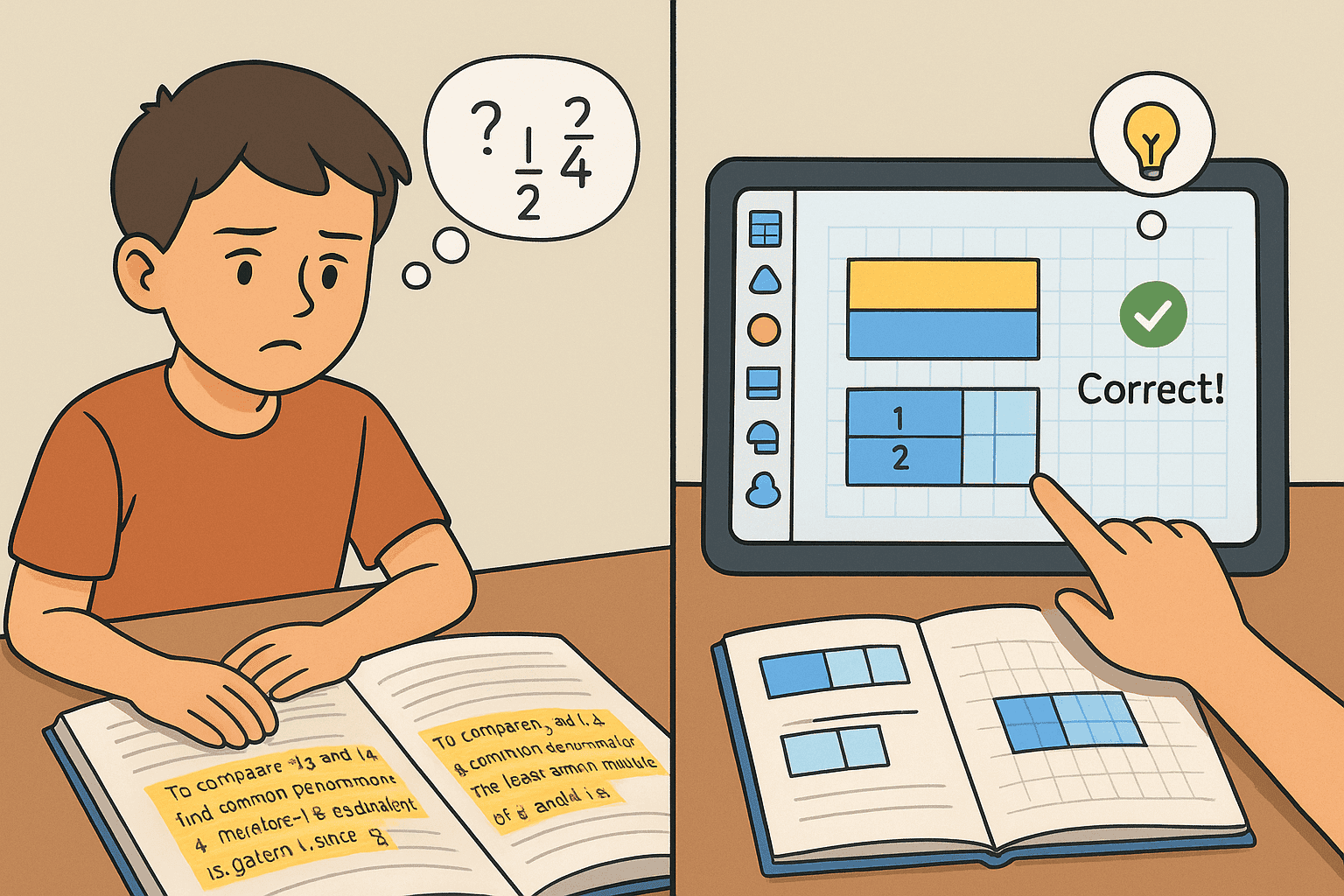
4. Story-Based Math Quests and Adventures
For kids who love adventure, story-based math quests transform equations into part of an exciting journey. Each correct answer helps a character climb a mountain, cross a river, or defeat a challenge. Students get so caught up in the story that they hardly notice how much math they’re practicing.
In many classrooms, teachers use these quests for weekly lessons. Students work in small groups, share strategies and cheer each other on as they complete missions. The result? Stronger math skills, better communication and a sense of teamwork that goes beyond academics.
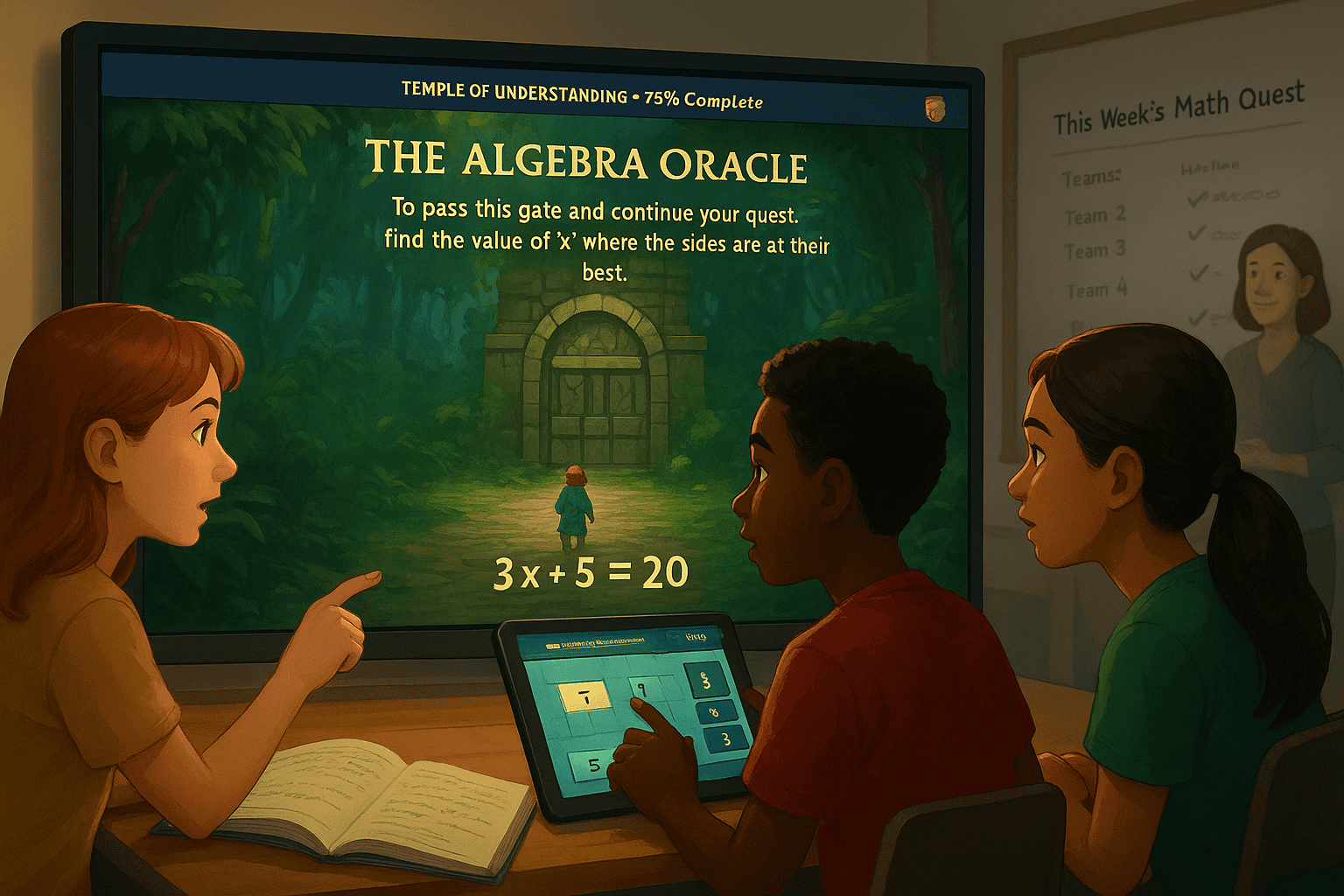
How Online Math Facts Games Help Reinforce Key Concepts
Learning math facts is like learning the alphabet, you need it before you can write. These basics make every other part of math easier. Online math fact games are one of the best ways to build this foundation.
If a student has to stop and figure out 7 × 8 each time, it slows them down and makes harder problems even tougher. Knowing the answer right away frees their mind to focus on bigger ideas.
Games make practice enjoyable. Kids will play longer than they would with flashcards. Instant feedback fixes mistakes right away, so wrong answers don’t stick. Just 10 minutes a day of fun practice can improve speed, accuracy, and confidence in math all year long.
Tips for Parents and Teachers to Make Math Fun and Stress-Free Online
Finding great games is the first step; fostering the right environment is the next. Here’s how parents and educators can maximize the benefits of fun math activities online.
For Teachers:
Make it part of class: Don’t use math games as extras. Fit them into your lessons. Try starting class with a quick game to review past topics. You can also set up learning stations—always include one with a digital game that matches what you’re teaching that week.
Use small groups: Pick games that let kids play together. Team play builds teamwork, communication, and peer support. Students explain their ideas to each other, which helps everyone understand better.
Watch progress, not just play: Choose tools that show you student progress on a teacher dashboard. Use that data to guide lessons, spot kids who need help, and celebrate improvements. You can also assign games that target skills each student needs to practice.
For Parents:
Make it fun together: Play a math game with your child. When you join in, they see that math matters and can be fun. It feels like play, not a lesson.
Praise the Effort, not just the Score: Cheer for how they solved a tough problem, not just for getting points. This builds confidence and persistence.
Keep it short and simple: Fifteen to twenty minutes of focused play is enough. Short, regular sessions work better than long, tiring ones.
Link to everyday life: If the game is about fractions, cut a pizza into halves and quarters. Connecting games to real life makes learning stick.
Conclusion
The path to better math scores doesn’t have to mean boring homework or stressful tasks. With fun online math activities, students can enjoy learning while they practice. These tools turn math into play, making it less scary and more rewarding.
They also give teachers helpful insights to guide lessons and give parents an easy way to support their child. Most importantly, they help students feel confident. When kids are free to try, make mistakes, and learn, their skills grow naturally. The truth is simple: when learning is fun, progress and confidence follow. It’s time to sign up, play, and see the difference.
Fun Online Math Activities - FAQs
How do fun math activities online reduce homework stress for kids?
Fun math activities online take away the pressure of worksheets by turning practice into play. Instead of filling rows of problems, kids solve challenges in colorful games that reward effort. This makes practice less intimidating and more enjoyable.
Students love the idea that “homework” can actually feel like a game, which helps them stay consistent with learning. Over time, this positive shift reduces math anxiety and keeps kids motivated throughout the school year.
What makes interactive math for students more effective than regular worksheets?
Interactive math games engage multiple senses—kids see, hear and play their way through lessons. Unlike worksheets that rely on repetition alone, online learning adds visuals, rewards, and instant feedback. This keeps students focused and excited while strengthening core math skills.
Teachers and parents also benefit because progress can be tracked instantly. With engaging activities, kids build new skills faster and retain concepts longer, making lessons feel more meaningful.
Can online math facts games improve a child’s speed and accuracy in calculations?
Yes, online math facts games are one of the best tools for building fluency in basic operations like addition, subtraction, multiplication and division. The repetition built into games ensures kids practice consistently, but in a way that feels fun, not forced.
Over time, they develop faster recall and stronger math skills. As accuracy improves, confidence grows, which directly impacts math scores. Parents often notice big improvements when kids spend just a few minutes each week on these activities.
How can parents support their children while using online math activities?
Parents play a big role in making online learning successful. The best approach is to set a routine, such as a few short sessions per week, so it becomes a habit. Choosing age-appropriate math games that match grade levels ensures kids feel challenged but not overwhelmed.
Parents can also celebrate progress, encourage teamwork in small groups, and remind kids that effort matters more than perfection. With support at home, students feel more confident and stay excited about math fun.
How often should kids engage in fun math activities online for best results?
Short, consistent practice works better than long, stressful sessions. Most educators recommend 3–4 times a week for 15–20 minutes each session. This gives kids regular exposure to math facts and new skills without overwhelming them.
Online learning allows flexibility, so parents can adjust schedules during the school year or summer. The key is balance, just enough practice to keep skills sharp while leaving room for play, creativity, and family time.
Can fun math activities online help children who struggle with traditional math homework?
Absolutely, students who find worksheets frustrating often thrive with online games. Fun math activities online give kids extra practice in a playful format, so they learn without stress. Mistakes become part of the game instead of something to fear.
Teachers also find that kids who struggle in class show more confidence when they use engaging platforms. Over time, this shift from frustration to excitement helps children build stronger math skills and better grades.
What types of fun math activities online help build problem-solving skills?
Problem-solving grows when kids face challenges that require more than quick answers. Online puzzles, escape-room style activities and story-based math adventures are great for this. These games encourage logical thinking, teamwork and creativity while reinforcing math facts.
Multiplayer modes also let students join small groups or teams, making learning social and collaborative. Parents and teachers love these activities because they prepare kids not just for higher math, but also for real-life problem-solving situations.
Comments
Your comment has been submitted